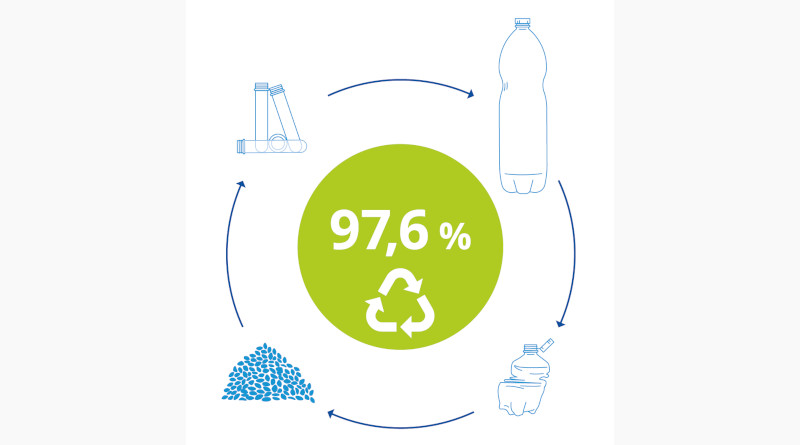German PET beverage bottle market 2023: more recycled content, less material use, high recycling rates
A recent study by GVM Gesellschaft für Verpackungsmarktforschung mbH reports record levels of recycled PET usage in bottle production and high recycling rates in Germany. Meanwhile, material consumption has decreased due to optimised bottle weights. Despite the higher costs of rPET, its usage continues to rise, with German preform and bottle production capacities adapting to meet evolving market demands.
In 2023, Germany produced a total of 380.6 kilotons of PET preforms and bottles, marking a 10.5% decrease of 45 kilotons compared to 2021. This reduction is mainly due to continuous weight optimisation of PET bottles. Using short neck threads and transitioning to tethered caps has further lowered material consumption, conserving resources while enhancing the recyclability of bottles.
An especially positive trend is evident in the use of recycled materials. In 2023, the share of rPET in German preform production exceeded that of virgin material for the first time, with 51.2% of materials sourced from recycled PET. The rPET share in bottle production also increased significantly to 46.9% for all bottles processed in Germany and 48% for deposit-based single-use bottles, representing a growth of 6.4 and 9.2 percentage points since 2021, respectively. “The continuous increase in recycled content demonstrates the innovative capacity and commitment to sustainability within the German PET industry,” said Dr. Isabell Schmidt, Managing Director of Circular Economy at the German Association for Plastics Packaging (IK).
Circular economy and foreign trade in the PET sector
Germany remains a leader in PET circularity, with the GVM study showing that 97.6% of PET beverage bottles were recycled in 2023—an affirmation of the effectiveness of the deposit system. 99% of all PET bottles were collected in Germany, ensuring that nearly all PET waste could enter the recycling stream. Most of this recycled material is directly reintegrated into production; 194.8 kilotons of rPET came from bottle-to-bottle recycling in 2023, underscoring the material’s circularity.
In trade, both imports and exports of empty preforms and bottles have declined compared to 2021. GVM estimates an import surplus of 39 kilotons in 2023, while 77% of beverages bottled in Germany used bottles or preforms produced domestically. Exports of filled bottles showed an excess of 11 kilotons, although this has decreased by 7 kilotons from 2021.
RPET demand remains strong despite price increases
The study further highlights an increase in rPET use despite market price volatility for recycled plastics. “The continued rise in recycled content, despite higher costs, reflects the determination of bottlers and manufacturers to meet their sustainability targets,” said Schmidt. Large bottlers have increasingly committed to higher levels of recycled content, contributing to stable growth in rPET use. These voluntary commitments have played a central role in this increase, a trend that is expected to continue amid upcoming EU regulatory requirements.
Germany’s PET recycling facilities are now so efficient that they can process more material than is available domestically, making PET bottle imports essential to maintain recycling capacity utilisation. An import surplus of approximately 20,000t was needed in 2023 to fully leverage these facilities.
Photo: In Germany, 97.6% of PET beverage bottles were recycled in 2023. According to GVM Gesellschaft für Verpackungsmarktforschung mbH, the organisation behind the study, further increases are hardly feasible; the objective now can only be to maintain this exceptionally high level.

